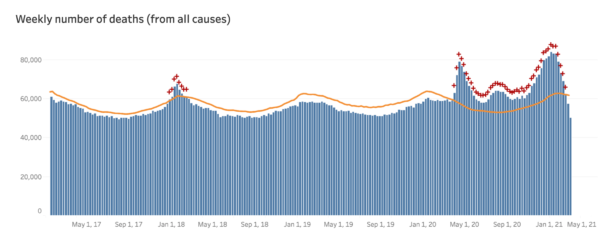I massively underestimated the impact of the Wuhan virus a year ago, both the health impact and more important, as it turned out, the consequences of the political response to the virus. This no doubt was due in part to the fact that I personally never had any fear of the Wuhan flu bug. So there have been a couple of times when I thought the Wuhan scare was nearly behind us. My track record isn’t very good, so you should take these comments with a grain of salt.
A considerable number of new Wuhan cases are still being reported, as this chart from the CDC web site reflects. Click to enlarge:

The number of cases reported to CDC is largely a function of the enormous number of covid tests that are now being performed. Still, the fact that a considerable number of new cases continue to turn up indicates that the virus has not yet finished working its way through the population, although some observers calculate that by now most Americans have either had the virus or been vaccinated against it.
Covid is widely regarded as a scourge because of the number of people who allegedly have died from it. Covid death statistics are notoriously unreliable: a number of shooting victims, for example, have been classified as covid deaths. Here in Minnesota, among other absurdities, a guy who was killed in a car accident was classified as a covid fatality. So death certificates, to the extent they are reliable at all, mostly reflect the numbers who happened to have the Wuhan bug when they died, not the number who would have lived, but for covid.
As is widely known, the overwhelming majority of Wuhan victims are not just elderly, but elderly and already sick and frail. (My 99-year-old father is elderly, but not sick. He tested positive for covid but otherwise didn’t notice it.) One doctor famously described the typical covid victim as someone who has one foot in the grave, and the other on a banana peel. The median age of death of reported covid victims is equal to, or–as in Minnesota–older than the average life expectancy. The fact that we have blighted the lives of our young people and devastated many millions of lives and businesses on account of this virus is, in my opinion, criminal.
All of that said, the Wuhan bug has in fact increased the number of Americans who have died over the past year. The best index of covid’s impact is, I think, the number of excess deaths over a demographically predicted norm. I have little faith in the CDC, a thoroughly politicized organization, but I assume they can aggregate local death statistics with reasonable accuracy, and this is what they report. The chart shows deaths from all causes. Again, click to enlarge:

Contrary to what some have suggested, covid has actually led to a substantial number of excess deaths compared to a demographic norm over the past year. But what is notable about this chart is that the number of excess deaths is sinking like a stone. What will be interesting to follow over the coming months is whether the total number of deaths declines below the demographic norm.
Why might this happen? Because most covid victims are people who were likely to die soon in any event, but whose death may have been accelerated by the Wuhan flu. I suspect that most Wuhan victims would have died a few months later, or perhaps a year or two later, regardless of covid.
If that hypothesis is correct, over the next year or two we should see overall mortality falling below the currently predicted norm. It is too early to tell whether that will happen, but if it does, it will put the scary Wuhan statistics that we have been bombarded with, for political reasons, in perspective. It is too bad if someone dies at age 80 rather than age 81, but it is insane to turn a society upside down, and in particular to devastate the lives of our younger generation, in a likely-futile effort to avert that increased risk of mortality among the unhealthy elderly.
If I am right in expecting that mortality statistics will decline over the next couple of years, our governments’ response to the Wuhan epidemic will go down in history as a catastrophic failure of public policy. Except, of course, for Operation Warp Speed, which more than anything else promises to bring the disaster to a halt.
Notice: All comments are subject to moderation. Our comments are intended to be a forum for civil discourse bearing on the subject under discussion. Commenters who stray beyond the bounds of civility or employ what we deem gratuitous vulgarity in a comment — including, but not limited to, “s***,” “f***,” “a*******,” or one of their many variants — will be banned without further notice in the sole discretion of the site moderator.